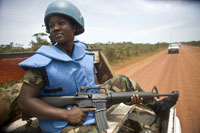Gender training for peacekeeping operations "is not something you do for two weeks before you go for deployment," says Florence Butegwa, UNIFEM representative to the African Union (AU) and U.N. Economic Commission for Africa (UNECA).
The growing international recognition of the value of female peacekeepers has spurred efforts by the AU, with support from UNIFEM, to increase the number of women in its peacekeeping operations.
Nigeria is leading the way in terms of African women’s presence in the deployment of peacekeeping forces, and is hoping to increase numbers in line with the global effort launched just over a year ago to raise the proportion of women in United Nations Police (UNPOL) peacekeeping operations to 20 percent by 2014.
This would be just over double the current 8.7 percent - 1,218 UNPOL women deployed around the world - according to the U.N.
Other African countries are following suit. Rwanda will be deploying 130 women under the joint U.N.-AU peacekeeping force in Darfur later this year.
Excerpts of Butegwa's interview with TerraViva follow.
Q: What specific efforts are being made to ensure the recruitment of more female peacekeeping officers?
A: This is part of the ongoing conversation at the African Union and with the member countries, because the recruitment is the responsibility of the member country. In countries like Rwanda we are partnering with the Ministry of Defence and the police forces to ensure that the country increases its own recruitment and focus on women in the armed forces.
The idea is to ensure that there is not only an increase in the numbers of women in Rwanda’s armed forces but also, when they contribute to U.N. or AU operations, those women who are very well trained will be deployed and that they will be of a level of seniority to make a difference.
Q: How have member states responded?
A: It varies from country to country. In Liberia, the effort was to have well-educated armed forces that understand human rights. Many women could not qualify, partly because of the general level of education of women in the country.
The government was able, with the support of the peace-keeping mission and U.N. organisations, to come up with a special curriculum for accelerated qualification for women and young men.
Q: The AU Commission is developing a gender-training manual for peacekeeping operations. How will the manual be used and by whom?
A: UNIFEM is supporting the Gender Directorate in this regard and the manual will be available for use both by the AU institutions and, most importantly, the troop-contributing countries. The idea is that gender should be integrated in the curriculum for training armed forces.
It’s not something you do for two weeks before they go for deployment. For effectiveness it must be part of the culture of training.
Q: What effect have women in peacekeeping missions had on peace and security in conflict zones?
A: It depends. For instance, I worked in Liberia [where] the whole idea is that women survivors - particularly of gender- based violence - feel more comfortable opening up to some of these women peacekeepers.
But dealing with and responding to gender-based violence as well as knowing how to understand the gender relations in a conflict area should be the responsibility of absolutely everyone.
Q: How is the opening of the application process to women likely to affect the nature of training which is perhaps viewed as having a very ‘masculine’ ethos?
A: I don’t know, because this is the beginning of a process. So far, in some countries they see a change, but obviously I think the underlying values of the command structure being masculine in nature also has to be interrogated. There has to be some conversation because it’s not just about passing on information and if the structures do not allow a soldier to respond accordingly...
The training obviously should not just be for rank and file [soldiers], because if the senior commanders are not able to integrate gender sensitivity in their command structure, then you don’t have an impact.
Q: Won’t women in peacekeeping forces themselves be vulnerable in any way to gender-based violence?
A: Without institutionalized gender sensitivity there is always a risk of that, but we have countries that have had soldiers who are women. For example, in the U.S. there are occasional cases of sexual harassment and abuse.
The important thing is that it is clear policy that this is unacceptable and that there is a mechanism for redressing that. So we hope that African governments take [it] seriously and the same kind of models are put in place.

No comments:
Post a Comment